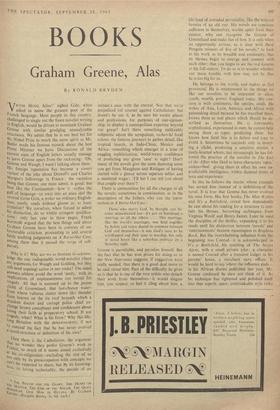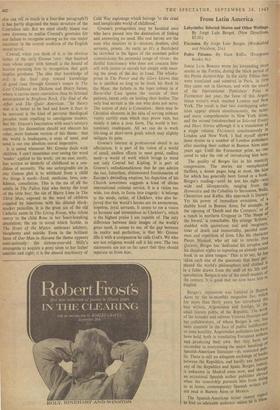BOOKS
Graham Greene, Alas
By RONALD BRYDEN
ViCTOR HUGO, helasr sighed Gide, when asked to name the greatest poet of the French language. Most people in this country,
challenged to single out the finest novelist writing in English, would be driven to nominate Graham Greene with similar grudging, unanalysable
reluctance. We admit that he is our best bet for th2 Nobel Prize in much the same spirit as Mr.
Butler made his famous remark about the best Prime Minister we have. Discussions of the current state of English letters usually manage to leave Greene apart from the reckoning : 'Oh,
Greene and Waugh, 1 wasn't talking about them.' His foreign reputation has become a covert
variant of the joke about Durrell's and Charles
Morgan's followings in France : the variation being that Greene, one must admit, is good; but how like the Continentals—how it 'verifies the
gulf of language--to erect into an alien idol the revered Grim Grin, a writer no ordinary English-
Than, surely, reads without gloom or, at least, irritation? We ourselves, when forced to admit his distinction, do so within stringent qualifica-
tions : only last year in these pages, Frank
Kermode argued that the best things said about Graham Greene have been in contexts of un- favourable criticism, proceeding to add several fairly scathing judgments on A Burnt-Out Case, among them that it passed the verse of self- Parody.
, Why is it? Why are we so hesitant to acknow- ledge the one indisputable world-novelist (there
arc arguments for Waugh and Golding, but they still need arguing) active in our midst? The usual answers seldom avoid the word 'seedy,' with its implications of unpleasantness too trivial for tragedy. All that is summed up in the jocose fcliché of Greeneland, that last-chance water-
Pnt where vultures clatter down like thunder
from heaven on the tin roof beneath which a drunken doctor and corrupt police chief ex- change brown concubines and confidences about losing their faith at preparatory school. If not ltragedy, What? What is his form? Why this life- long flirtation with the detective-story, if not I': Conceal the fact that he has never evolved novel-structure or definition of his own?
Then there is the Catholicism, the argument that no wonder they prefer Greene's work in Prance, so much of it seems aimed exclusively at his co-religionists—excluding the rest of us no L°1.113/ by its preoccupation with concepts we . be expected to share, but by its knowing- ness •
• its loving technicality, the parade of an
•
t TH u /If, ‘..E POWER AND THE GLORY, THE HEART OF ' MATTLR, THE END OF THI: AFFAIR, pA ,
AN, n
Greene. IC THE QUIET Am s-I L OUR MAN IN HAVANA. By Graham r'ene. (Penguin Books, 3s. 6d. each.) initiate's ease with the eternal. Not that we're prejudiced (of course) against Catholicism; but doesn't. he use it, as he uses his exotic places and professions, for purposes of one-upman- ship, to display a cosmopolitan expertise beyond our grasp? Isn't there something unlikeably solipsistic about the scrupulous, recherche local colour, -the famous journeys to gather detail, like tropical insects, in Indo-China, Mexico and Africa—something which emerges in a tone of nagging sophistication, world-weary confidence of predicting any given 'case' at sight? DOn't many of the novels give the same damning sense you get from Maugham and Rattigan of having started with a glance across separate tables and a muttered wager : 'I'll bet I can tell you about that couple over there'?
There is ammunition for all the charges in all the novels; sometimes in combination, as in the - description of the fathers who run the lepro- sarium in A Burnt-Out Case: Those who marry God, he thought. can be- come domesticated too—it's just as humdrum a marriage as all the others... . . This marriage. like the world's marriages, was held together by habits and tastes shared in common between God and themselves—it was God's taste to be worshipped and their taste to worship, but only at stated hours like a suburban embrace on a Saturday night.
Greene is parodiable, and parodies himself. But the fact that he has won prizes for doing so in the New Statesman suggests, if suggestion were really needed, that there is a good deal more to be.said about 'him. Part of the difficulty he gives us is that he is one of the rare artists who detach their work from themselves—it would disgust him. you suspect, to feel it cling about him, a life-load of extruded personality, like the tettcred hernias of an old tree. His novels are creations sufficient in themselves, worlds apart from their creator, who can recognise the Greene of Greeneland and make fun of him. It is only when an opportunity arrives, as it does with these Penguin reissues of five of his novels,* to look at his work in its breadth and continuity, that its themes begin to emerge and connect with each other; that you begin to see the real. Greene at his full stature. To do so is to wonder whether our main trouble with him may not he that he is too big for us.
He belongs to the world, and makes us feel provincial. He is uninterested in the things we like our novelists to be intereste'd in—class, youth, wealth, power, England today. His con- cern is with continents, the species, souls. He writes of Asia, Latin America and Africa with painstaking detail because he has travelled them, knows them as real places which should be de- scribed as themselves. He is irrevocably sophisticated, experienced in men; he cannot help seeing them as types, predicting them, but knows how fatal this is to fiction and tries to avoid it. Sometimes he succeeds only in invert- ing a cliché, producing a sensitive dentist, a steely-hearted whore; but increasingly he has fol- lowed the practice of the novelist in The End of the Affair who liked to leave characters 'open.' undescribed : giving them in effect his own un- predictable intelligence, within dictated limits of taste and experience.
In this he follows the master whose example has served him instead of a definition, of the novel. It is true that Greene has never evolved his own form. His first books, The Man Within and It's a Battlefield, reveal how dependently he cast about his reading for a structure to con- tain his themes, borrowing techniques from Virginia Woolf and Henry James. Later he used the discipline of the thriller, expanding it to his needs until his distinction between 'novels' and 'entertainments' became meaningless in Brighton Rock. But the overwhelming influence from the beginning was Conrad—it is acknowleCged in It's a Battlefield, his resetting of The Secret Agent, with a small private joke : a character is named Conrad after a transient lodger in his parents' house, a merchant navy officer. It would be hard to say where the influence ends— in his African diaries published last year, Mr. Greene confessed he dare not think of it. As his technique has tightened and polished itself into that superb, spare, unmistakable style (who
else can tell so much in a four-line paragraph?) it has partly disguised the basic structure of the Conradian tale. But we must chiefly blame our own slowness to realise Conrad's greatness for our failure to recognise among us his one major successor in the central tradition of the English moral novel.
Conrad, when you think of it, is the obvious father of the early Greene hero: that haunted man whose anger with himself is the hound of heaven pursuing him to recognition that guilt implies goodness. The idea that knowledge of evil is the final step toward knowledge of good runs through Greene's essays in The Lost Childhood on Dickens and Henry James, where it carries more conviction than its fictional development in Brighton Rock, The End of the Affair and The Quiet American. The theory that it is better to be bad and know it than to be innocent is the kind of perverse theological paradox most repelling to unreligious readers. But Mr. Greene's fascination with men's salutary capacity for damnation should not obscure his other, more humane version of this theme : that the world is inadequate, a state of need, and need is our one absolute moral imperative.
It is stated whenever Mr. Greene deals with children. I can't remember ever seeing the word 'tender' applied to his work; yet no one, surely, has written so tenderly of childhood as a con- dition of necessity. The one unforgivable sin in any Greene plot is to withhold from a child the things it needs—food, medicine, love, con- fidence, consolation. This is the sin of all the adults in The Fallen Idol who betray the trust of the little boy; the sin of Harry Lime in The Third Man, exposed in the ward of children crippled by injections with his diluted black- market penicillin. It is the great sin of the old Catholic aunts in The Living Room, who refuse mercy to the child Rose in her heart-breaking desolation; the sin to avoid which Scobie, in The Heart of the Matter, embraces adultery, blasphemy and suicide. Even in the brilliant farce of Our Man in Havana the theme appears semi-seriously : the sixteen-year-old Milly's stratagems to acquire a pony seem to her father sensible and right; it is the absurd machinery of Cold War espionage which belongs `to the cruel and inexplicable world of childhood.'
Greene's protagonists may be haunted men who have passed into the damnation of feeling and answering no need. His real heroes are the men who minister to it—doctors, dentists, civil servants, priests. As early as It's a Battlefield he sketched in the figure of the assistant police commissioner his perennial image of virtue: the dutiful functionary who does not concern him- self with justice or morals but simply with meet- ing the needs of the day in hand. The whisky- priest in The Power and the Glory knows that he is justified so long as he feeds his flock in the Mass; the fathers in the leper colony in A Burnt-Out Case ignore the morals of their patients, intent only on healing their bodies. The only bad servant is the one who does not serve. The notion of duty is Conradian : there may be Christian elements in the idea of serving without vanity earthly ends which may prove vain, but mostly it takes a stoic form. The world is bot- tomlessly inadequate. All we can do is work life-long at short-term goals which may slightly mitigate its pain.
Greene's interest in professional detail is no affectation. It is part of his vision of a world of small, endless efforts to meet great, endless need—a world of work which brings to mind not only Conrad but Kipling. It is part of Greene's unfashionableness that he can admire the last, futureless, disinterested functionaries of Europe's dwindling empires; his depiction of his Church sometimes suggests a kind of divine international colonial service. It is a vision too wide, too drab, to focus into tragedy: it belongs to the mode, rather, of Chekhov, who also be- lieved that the world's heroes are its anonymous, hopeless, loyal servants. It seems to me a vision as humane and tremendous as Chekhov's, which is the highest praise I am capable of. The only difference between their images of the world's great need, it seems to me, of the gap between its reality and perfection, is that Mr. Greene fills it with a compassion he calls God's. We who are not religious would call it his own. The two statements are not so far apart that they should separate us from him.



































 Previous page
Previous page